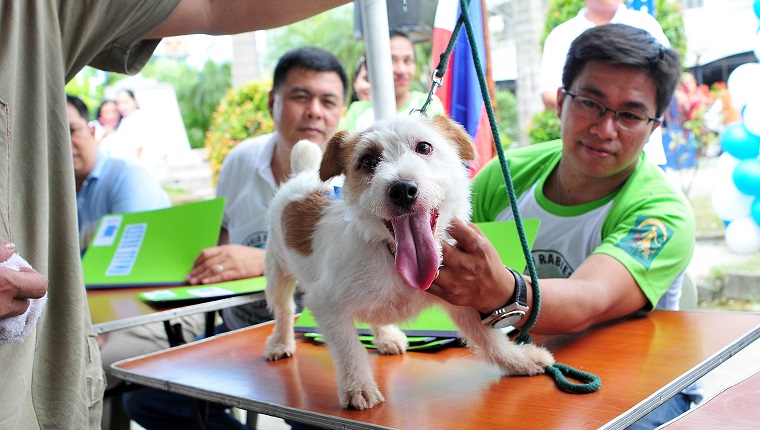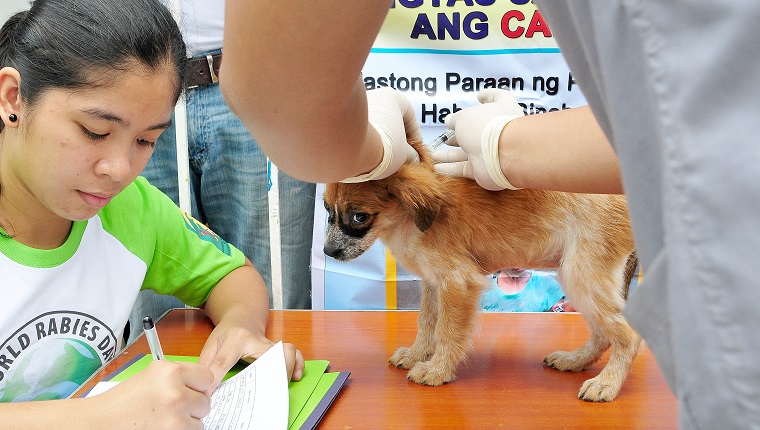Rabies is likely the most widely-known animal disease in the world. But thankfully, on World Rabies Day each year, we are reminded that it is also one of the most preventable.
This annual day of awareness, launched in 2007, helps educate people about the dangers of rabies in North America and around the world. Mark this year’s World Rabies Day, September 28th, by making sure your pets are up-to-date on their rabies vaccinations, and encourage friends and family to do the same for their pets.
Help us spread the word on World Rabies Day to promote prevention and raise awareness around the globe.
The Effects Of Rabies Around The World
The effects of rabies can be tragic. In the United States and much of the Western world, rabies is thankfully quite rare; an average of only one to two Americans die annually from exposure to the disease.
However, rabies kills tens of thousands of people worldwide each year, according to the American Veterinary Medical Association (AVMA), making education and pet vaccinations against the disease key to eliminating rabies infections in afflicted regions.
On a global scale, many rabies cases in humans that end in death are transmitted through dog bites. More than 100 different countries report that many of the thousands of people who die from rabies infections are children bitten by infected dogs.
What Can Humans Do To Stop The Spread Of Rabies?

In statement released in tandem by the Food and Agriculture Organization of the United Nations (FAO), the World Organisation for Animal Health (OIE), and the World Health Organization (WHO), it’s estimated that by vaccinating at least 70 percent of a country’s dog population, the cycle of transmission from dogs to humans can be broken, saving the lives of humans and dogs alike.
Rabies-infected livestock can also wipe out full herds, leading to food insecurity in already impoverished regions. This makes rabies education and vaccination programs an important public health issue in places like Africa, Asia, and South America, where rabies deaths in humans are still far too common.
Here in the United States, vets use World Rabies Day to educate pet parents about rabies symptoms and the importance of keeping one’s pets current on vaccinations against the deadly disease.
What Are The Symptoms Of Rabies In Dogs?
The symptoms of rabies in dogs are easy to spot and usually occur in two painful stages. The first is typified by a stark change in temperament. Dogs become restless, bite at themselves or at imaginary objects. They can be apprehensive, insecure, and even experience pain insensitivity.
The second is called the paralytic stage. The dog stops eating and drinking, and their mouth tends to droop open, dripping with foamy saliva. As dehydration takes over, total paralysis starts to set in, and the animal is close to death. Sadly, there is no treatment or cure for rabies.
Vaccinations And Prevention
Dogs should receive their first rabies vaccination at three to four months of age as recommended by their vet. Then they should continue to receive booster vaccinations throughout the rest of their lives.
Some cat parents neglect to take their cats to the vet for their rabies vaccine. But even indoor cats can get loose or suffer exposure to the disease by coming into contact with infected wildlife.
All cats, just like dogs, should receive their first rabies vaccination from a licensed veterinarian when they’re around four months of age, and cat parents should always make sure their feline friends get inoculations for full protection against this horrible but overwhelmingly preventable disease.
But rabies infection doesn’t just affect dogs, cats, and humans. Wild animals, most commonly bats and raccoons, can carry the disease, too, and can spread it to humans and pets.
People should limit their interaction with wildlife and report suspected rabies cases to local animal control as soon as possible.
For further information about the rabies virus, global rabies eradication campaigns, or to find out how you can participate in World Rabies Day, visit the Global Alliance for Rabies Control website today.
Will you help spread the word on World Rabies Day? Have you vaccinated your pets against rabies? Then let us know in the comments below!










